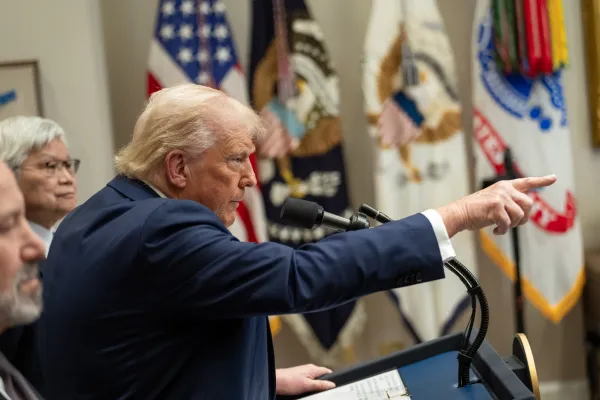The European Union’s trade chief said the 27-member bloc is committed to securing a trade deal with the US based on “respect” not “threats”.
It comes after US President Donald Trump threatened to slap a 50% tariff on all goods sent to the US from the EU.
“The EU’s fully engaged, committed to securing a deal that works for both,” EU Trade Commissioner Maros Sefcovic said after a call with US Trade Representative Jamieson Greer and Commerce Secretary Howard Lutnick.
“EU-US trade is unmatched & must be guided by mutual respect, not threats. We stand ready to defend our interests.”
Earlier on Friday, Trump expressed impatience with the pace of ongoing EU-US trade negotiations, saying his plan to raise tariffs on 1 June was set.
Writing on social media, Trump said: “Our discussions with [the EU] are going nowhere,” adding that there would be no tariffs for products built or manufactured in the US.
“I’m not looking for a deal – we’ve set the deal,” he told reporters later, before immediately adding that a big investment in the US by a European company might make him open to a delay.
The EU is one of the Washington’s largest trading partners, sending more than $600bn (€528bn; £443bn) in goods last year and buying $370bn worth, US government figures show.
Reacting to Trump’s threats, European governments warned that higher tariffs would be damaging to both sides.
“We do not need to go down this road,” said Ireland’s Taoiseach (Prime Minister) Micheál Martin. “Negotiations are the best and only sustainable way forward.”
France’s Trade Minister Laurent Saint-Martin, said: “We are maintaining the same line: de-escalation, but we are ready to respond.”
German Economy Minister Katherina Reiche said the bloc “must do everything” to reach a solution with the US.
While Dutch Prime Minister Dick Schoof told reporters that he backed the EU’s strategy in trade talks and “we have seen before that tariffs can go up and down in talks with the US”.
The EU is negotiating with the US as a bloc, though Stephen Moore, a former economic advisor to Trump who works for conservative think tank the Heritage Foundation, told the BBC: “What may happen in Europe… is that we may try to negotiate individually with countries in Europe.”
He added that in his opinion Trump’s “ultimate aim is really to decouple not just the US but the whole world from Chinese influence which would be a very good thing if he could pull that off”.
In early April, Trump announced tariffs against a long list of countries, including a 20% tax on most EU goods being sold into the US.
Soon afterwards, the president paused the higher tariffs for three months, until 8 July, to allow for more negotiations, but kept a 10% baseline tax in place against the US’s trade partners.
Higher US tariffs also remained in place against China though they were substantially lowered.
Despite the climbdown from Trump, the US kept a 25% tariff against EU steel and aluminium imports in place.
The EU has threatened – and paused – its own measures against the US. It said it would introduce a 25% tariff on €18bn ($20bn; £15bn) worth of US goods coming into Europe but this has been put on hold.
It is also currently consulting on additional measures against US imports into the US valued at €95bn.
Trump’s complaints about Europe have focused on what he claims is an uneven trade relationship – the EU sells more goods to the US than it buys from America.
Trump blames a trade deficit on policies that he claims are unfair to American companies, and he has specifically raised concerns about policies related to cars and agricultural products.
Trump also warned Apple that he would impose a 25% import tax “at least” on iPhones not manufactured in America, later widening the threat to any smartphone.
Shares in the US and EU fell on Friday after the latest threats, with America’s S&P 500 down about 0.7% and Germany’s Dax and France’s Cac 40 ending the day down more than 1.5%.
[BBC]



